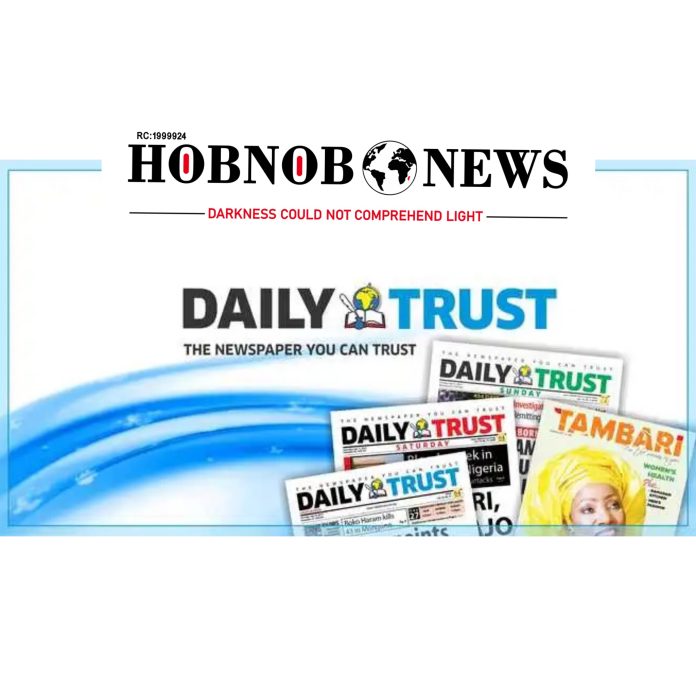The National Media Complaints Commission (NMCC), or Ombudsman, released its report on the complaint filed by the Federal Ministry of Information and National Orientation against Daily Trust. The commission’s 19-page report found Daily Trust’s story on the Samoa Agreement to be “inaccurate.”
After scrutinizing the government’s complaint and the newspaper’s response, the NMCC accused the federal government of poor handling of issues surrounding the Samoa Agreement. The commission stated that greater openness, transparency, and accountability could have avoided conjectures and speculations.
“The NMCC finds that the 403-page Samoa Agreement does not in fact contain any clause that compels underdeveloped and developing nations to support the agitations by the Lesbian, Gay, Bisexual, Transgender, and Queer (LGBTQ) community for recognition as a condition for getting financial and other supports from advanced nations. Indeed, there is no reference whatsoever in the agreement to the issue of LGBTQ,” the report stated.
The Ombudsman directed Daily Trust to issue an apology in both print and online editions for the inaccuracies. The commission also commended the federal government and Daily Trust for submitting to the co-regulatory mechanism.
“Whilst the Daily Trust may be commended for its healthy interest in a story of national and global importance…the same cannot be said for its performance with respect to the other provisions of the relevant portions of the Code,” the report said.
The NMCC criticized the federal government’s lack of transparency, stating that proactive announcement and explanation of the agreement’s essentials, implications, and benefits could have avoided controversy.
“Transparency and accountability are crucial aspects of the democratic process, including for the purpose of earning and enjoying public trust. It would certainly have helped to inform the public about the agreement much earlier,” the Ombudsman stressed.
The commission recommended that the government adopt a more open and proactive approach to information dissemination.
“In this digital age, the lesson here should be that proactivity in information dissemination across all offices of the government and all tiers of government on matters of public interest is a non-negotiable element of democratic governance. The government and all its institutions have an obligation to abolish the prevailing culture of secrecy in governance, as it gives the impression that government holds its citizens in contempt,” the commission said.
The NMCC’s chair, Emeka Izeze, leads a team including A. B. Mahmoud (SAN), former president of the Nigerian Bar Association; Prof. Chinyere Stella Okunna, Deputy Vice Chancellor of Paul University; Lanre Idowu, Editor-in-Chief of Diamond Publication; and Edetaen Ojo, Executive Director of Media Rights Agenda.
Other members include Dupe Ajayi-Gbadebo, journalist, lawyer, and arbitrator; Eugenia Abu, broadcaster, author, and columnist; and Dr. Hussain Abdu, Country Director of Care International (Nigeria).
The Ombudsman’s report emphasized the importance of adherence to journalistic standards, as stipulated in the 2022 Revised Code of Ethics for Nigerian Journalists.
Daily Trust’s report, published on July 4, 2024, violated Article 2.1 of the Revised Code of Journalism Ethics, 2022. The government’s original complaint, submitted by Dr. Ngozi Onwudiwe, alleged that the report posed a threat to national security.
The NMCC’s ruling underscored the need for balanced reporting and accountability in the media.
The commission’s recommendations aim to promote transparency, accountability, and ethical journalism practices in Nigeria.
By emphasizing the importance of openness and proactive information dissemination, the NMCC seeks to strengthen democratic governance and public trust.
The Samoa Agreement controversy highlights the need for accurate reporting and government transparency.
The Ombudsman’s report provides valuable insights into the importance of ethical journalism and government accountability.
The NMCC’s findings and recommendations serve as a guiding principle for media practitioners and government institutions.
The report’s emphasis on transparency, accountability, and ethical journalism practices aims to foster a more informed and engaged citizenry.
By promoting these values, the NMCC contributes to the development of a robust and responsible media landscape in Nigeria.

